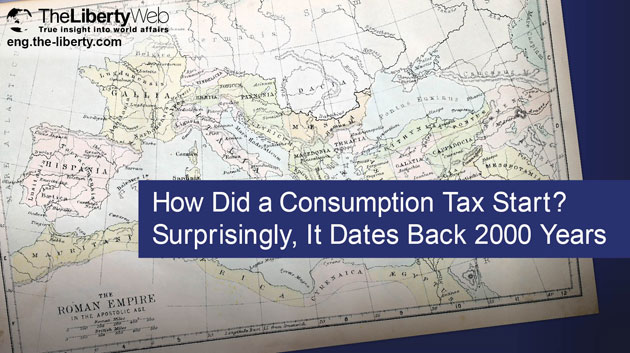How Did a Consumption Tax Start?
Surprisingly, It Dates Back 2000 Years
Arguments have surfaced over the pros and cons of the consumption tax increase as Japan witnessed a negative growth of GDP for the October-December period of 2015.
On February 26th, Chief Cabinet Secretary Yoshihide Suga said, “I don’t think it is possible the government will raise the tax rate if tax revenues are expected to be reduced.” On February 29th, Japanese Prime Minister Shinzo Abe also said, “It would not make sense to raise the sales tax if it hurts the economy to lead to a decrease in tax revenue.”
The consumption tax increase will definitely be one of the campaign issues related to the economic recovery for the upcoming election.
The Abe administration is trying to implement tax hikes in various areas to restore the nation’s fiscal health, and the consumption tax hike is one of them. As you can see from the fact that the social security-related expenditures including pension accounts for about one third of the fiscal 2016 state budget, the main objective of raising taxes is said to supplement the social security-related expenditure.
So let us look at how and for what was a consumption tax was introduced into world history in the first place?
The Consumption Tax Increase Brought About the Decline of the Ancient Roman Empire
Tracing back in history, the sales tax originated in the Ancient Roman Empire. It supposedly started when Augustus, the first Emperor of the Roman Empire, levied a 1% tax across the board on profits made through trading commodities and services. This commodity tax is said to have supported the finance of the Roman Empire.
After that, the Roman Empire had to increase its military expenditure to maintain its territory, which worsened the financial condition. One school of thought holds that to compensate for the lack of financial sources, the empire raised the commodity tax rate, which led to the decline in commerce and industry, and finally to the decline of the Roman Empire over a long period of time. (Refer to “Understanding Economics: A Historical Approach” by Makoto Mogi/published by DIAMOND, Inc.)
Germany Reinstated a Consumption Tax in More Recent Times
After the fall of the Roman Empire, it was the German Empire (the Second Reich) during World WarⅠthat reinstated a consumption tax. The German Empire imposed a 1% tax on the postal traffic to raise funds for war. After its defeat in World WarⅠ, the empire started to levy a 2.5 % tax on all consumption to pay for the wartime reparation.
The empire reduced the tax rate to 0.75 % in 1926 because it achieved the needed economic stability. However, when the Nazis took the reins of the government and World War Ⅱ started, Nazi Germany raised the consumption tax rate to 2.75 % to finance the war effort.
France also introduced a sales tax in 1948, because reconstructing the country after World WarⅠcost a huge amount of money.
A Consumption Tax Is Implemented for the purpose of achieving long-term profits rather than short-term profits
Afterwards, countries in the world began to introduce consumption tax as an important financial resource to benefit social welfare spending. Japan introduced a consumption tax in 1989 to carry out financial reconstruction, but now the main purpose of the consumption tax is to cover the expense of social security.
Looking back over modern history, the consumption tax was introduced on a short-term basis for military preparation and reconstruction. At present, it is implemented to secure tax revenue to improve the nation’s budget balance and keep the social security system sustainable over a long period of time.
As part of joint reform of social security and taxation, the Japanese government is now trying to increase taxes to enhance the social security system. However, this would create a vicious cycle: companies and individuals will have less cash-on-hand, which will dampen consumer demand and corporate investment, causing economic downturn. Then, more and more people will rely on social welfare services, leading to less tax revenue and further tax hikes.
According to the estimates that Mr. Yutaka Harada, former professor of Waseda University has proffered that the Japanese government will have to raise the consumption tax rate to nearly 70 % as of 2060 to finance social security costs through taxpayer’s money.
Here again the consumption tax hike on a long-term basis will cause a negative chain reaction to occur. Instead, it is necessary for the government to aim to achieve economic growth by increasing consumption and investment through reducing taxes.



















